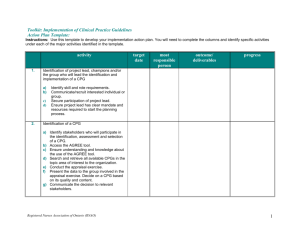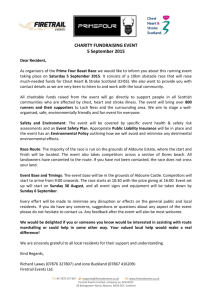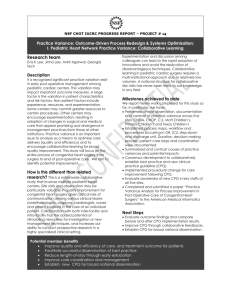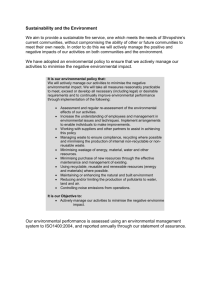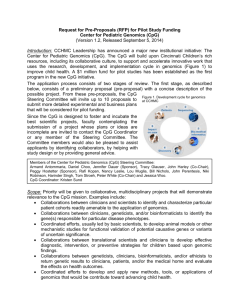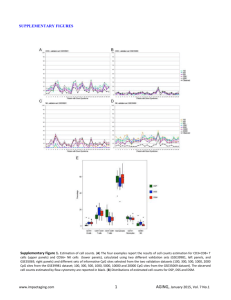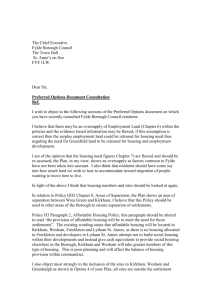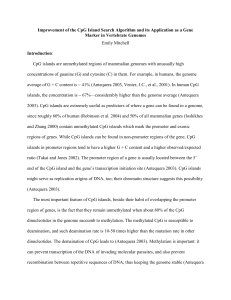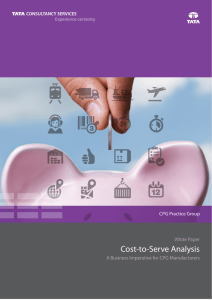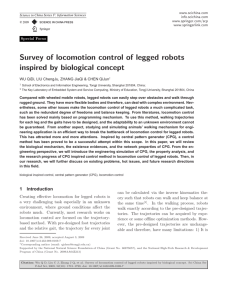CPG Environmental Policy
advertisement
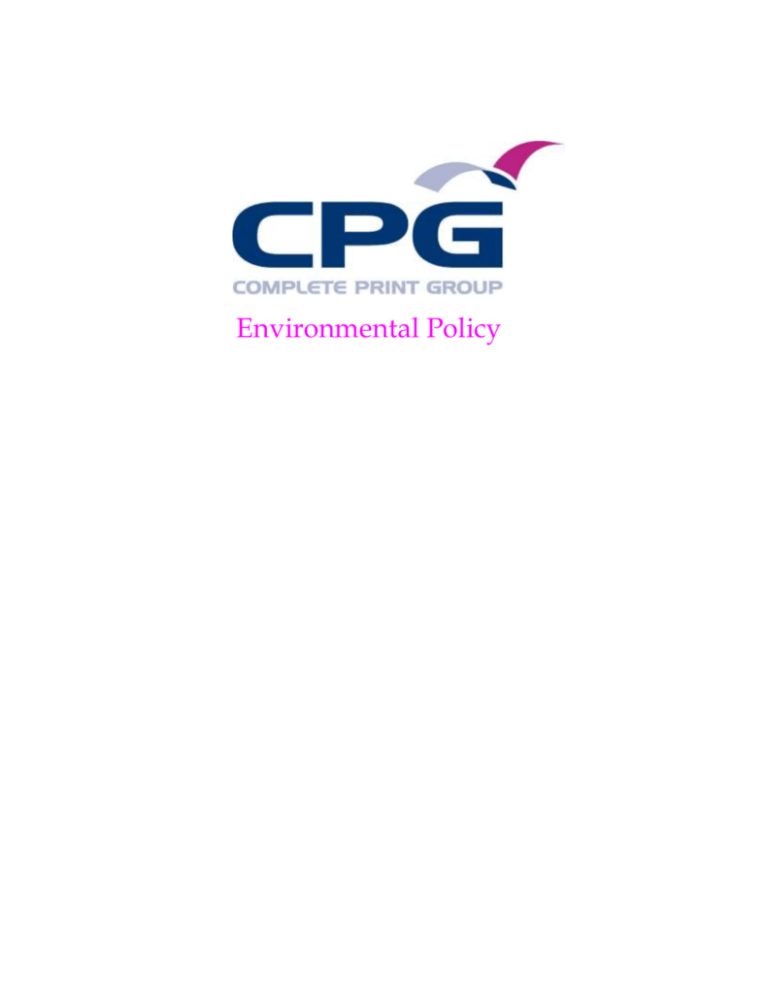
Environmental Policy General statement of policy CPG has in force a policy committing the Company to conduct its business with respect and care for the environment. The Company recognizes that world resources are not limitless and this, combined with the fact that all industrial processes, including printing, potentially cause the environment harm, is why the Company has made care of the environment a key element in all working practices, processes and operating methods. The Company accepts a responsibility of care for the environment and has put in place environmentally friendly measures, not just to comply with legislation, but where possible to better what is required. The Company does not just pay lip service to environmental matters; it accepts that both manpower and financial resources have to be committed to improving and maintaining good environmental practices. We believe that dealing positively with environmental issues, along with health and safety must be an integral part of all business activities and will have the effect of strengthening our business. We therefore have an on-going programme of action involving all employees in training and in the debate as how best to improve working practices ensuring a positive outlook towards the environment. Key policy commitments are listed overleaf. In order to ensure the achievement of these commitments, CPG has implemented the environmental management system ISO 14001 for which we achieved accreditation in July 2009 Steve Kirkham Environmental Officer Key policy items Waste in all areas to be kept to an absolute minimum. All waste paper, including guillotine trimmings, is sorted and placed in special containers to be collected for recycling. All machine-cleaning rags are fully used before being sent for laundering. Recyclable rather than disposable products and materials are used wherever possible. All laser printer toner cartridges are sent for refilling, and are reused by a charity. However, we will strive to investigate options for the re-use on site. All unnecessary car and van journeys are avoided and any small deliveries over any distance being sent by national carrier, accept in exceptional circumstances. All journeys on company business, whether car or van, delivery or collection are arranged in the most economical pattern in order to reduce fuel consumption by keeping mileage to a minimum. Care is taken to avoid wasting water and energy by ensuring water supplies and electrical circuits are turned off when not required. Used developer is rebottled and collected by a licensed disposal organisation. Disposal company operating licenses are regularly checked and verified. We strictly monitor the disposal of process effluents. Chemicals are only disposed of by rigorously following the manufacturer’s instructions. Cleaning chemicals are used in hand dispensers and not aerosols. Where ever possible we try to ensure that any paper used has derived from sustained forestry management and is elemental chlorine free. Recycled paper is used as and when requested by clients. Accountabilities for Environmental Issues Good environmental performance is the accountability of all at CPG. However, the following people have specific duties: Employee’s accountabilities Each employee is accountable for: • Co-operating with CPG management to achieve safe, healthy and environmentally sound operations within our site and outside. • Not interfering with, or misusing any device provided to meet our environmental obligations or policy. Duty Person(s) Overall and final accountability for environmental performance Contact: Steve Kirkham Environmental Co-ordinator Contact: Steve Kirkham Person responsible for operational conditions Contact: Steve Kirkham Specific Arrangements Operations shall comply with appropriate legislation and guidance relating to this. CPG shall maintain an up-to-date register of relevant legislation. The primary guidance is PG6/16 Secretary of State Guidance on Print works. Communication and training CPG recognise the way to achieving a good environmental performance throughout the entire company is to involve all staff and make them aware of the processes and systems in place. Therefore, we shall ensure that appropriate personnel are made aware of the processes and systems through appropriate communication and/or training. Pollution minimisation Storage, transportation and operations shall be conducted to minimise ground or water pollution or the potential for pollution, so far as is reasonably practical. Systems shall be in place, and personnel trained, to cope with spillages in order to prevent contamination of land or water courses. Energy conservation Operations shall be carried out to conserve energy, so far as is reasonably practical. This shall include reducing unnecessary heat loss and unnecessary electricity usage through leaving equipment running or lights burning when not required. Where possible, operations shall be carried out in such a way as to minimise the energy used. Transport Where possible, transport operations shall be organised to minimise the number of journeys made by road vehicles and their duration. This shall include avoiding trips with a half-empty vehicles, repeated runs to the same area and runs at peak periods when waiting times with the engine running and acceleration and braking are likely to be greater. Where rail transport is a viable alternative, then this shall be used in preference to road transport. Company vehicles shall be chosen with fuel type and usage as a primary consideration. Emissions Operations shall be carried out to minimise emissions to air. This shall include, but not be limited to: • Minimising the use of IPA through both minimising the percentage in the fount solution and investigating the possible use of alternatives • Using class IIIA solvents where possible • Using dispensers for hand-applied solvents, rather than open-lidded tins • Closing lids on bins containing solvent-soaked wipes Effluent Processes shall be chosen to minimise the likelihood of effluent discharge via the drains. Solvents Solvents shall be chosen, as far as is reasonably practical to follow the HSE solvent preference criteria of: Least preferable IA IIA IIIA Most preferable Vegetable based Solvents shall be used in a way to minimise emissions to air and to reduce the potential Concentrations in which they may be inhaled to be considerably below occupational exposure standards. Solvent shall be stored and transported in such a way as to minimise the potential for leakage to either ground or drains. Appropriate spill kits and procedures shall be in place to cope with any spillage that occurs, and people should be trained or otherwise made aware of the procedures. Other chemicals Other chemicals shall be chosen and controlled in such a way as to: Minimise the potential environmental impact during normal use or in the case of a spillage, etc. Minimise the potential health impact of substances where there is a known health risk, such as ink strippers containing dichloromethane. Purchasing and raw materials Within the constraints of customer requirements, purchasing decisions shall be made with due regard to the environmental consequences of the decision. In the case of paper, paper shall be purchased from mills that • Use wood pulp from a renewable source. The wood we use is primarily spruce or eucalyptus from forests which are replanted on a regular basis. We shall not purchase paper from mills using wood from rain forests or other hardwood sources. • Recycle internal waste materials • Remove all effluent from water before discharge and • Do not use chlorine in the paper production process Where possible, materials shall be “environmentally friendly.” However, CPG realises that the high quality nature of the sector in which we operate means that recycled papers are not likely to be used unless specifically requested by a client. Waste All wastes shall be segregated to maximise the environmental opportunities of subsequent waste treatment or disposal processes. All wastes shall be removed and processed by licensed waste contractors and the systems used shall comply with the requirements of the Hazardous Waste Regulations 2005. CPG shall also determine how this waste shall be processed such as recovery, recycling or combined heat and power systems. Unless there is no reasonably practical alternative, CPG shall avoid sending waste directly to landfill. Stephen Kirkham 8th July 2009

